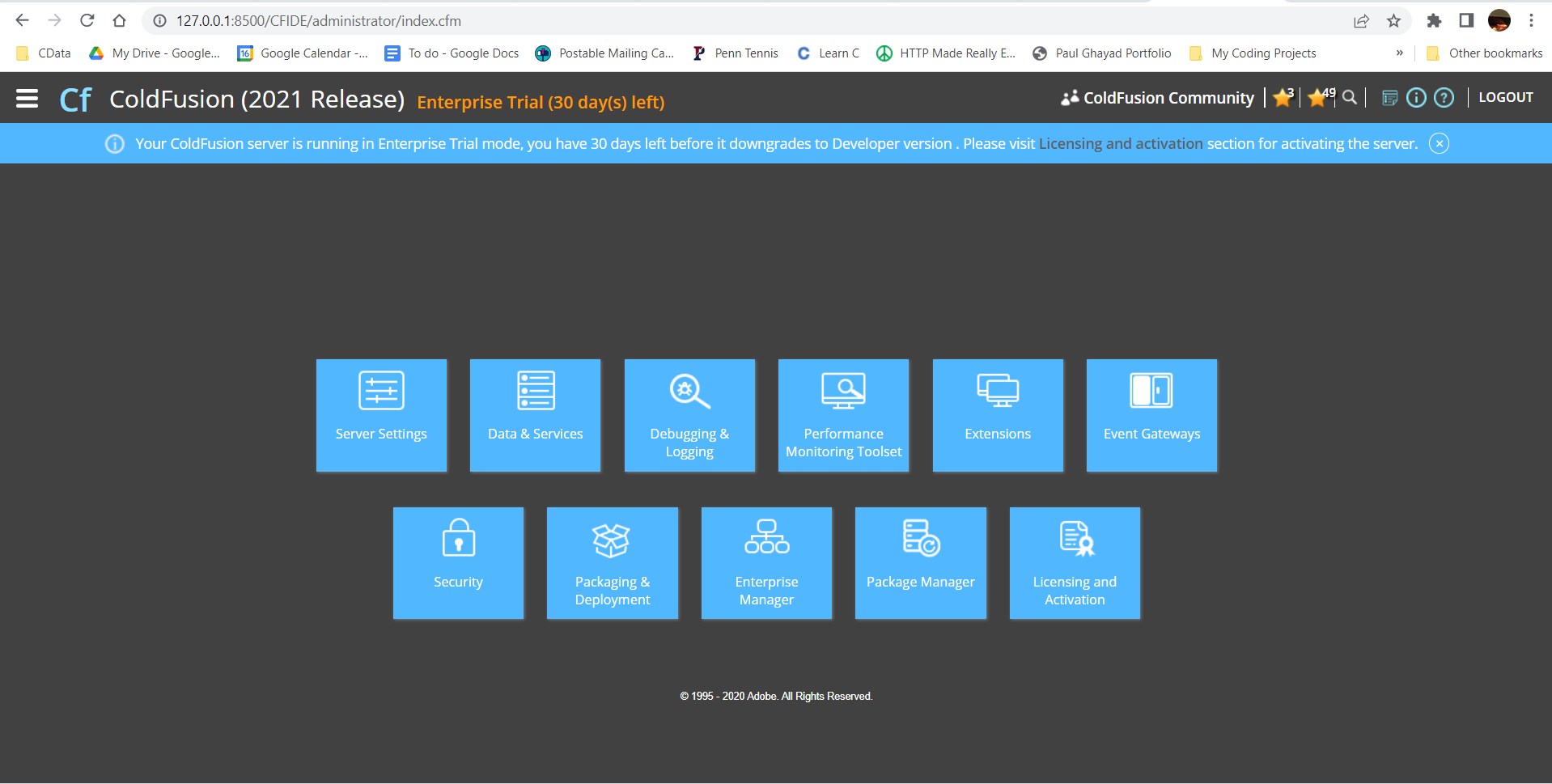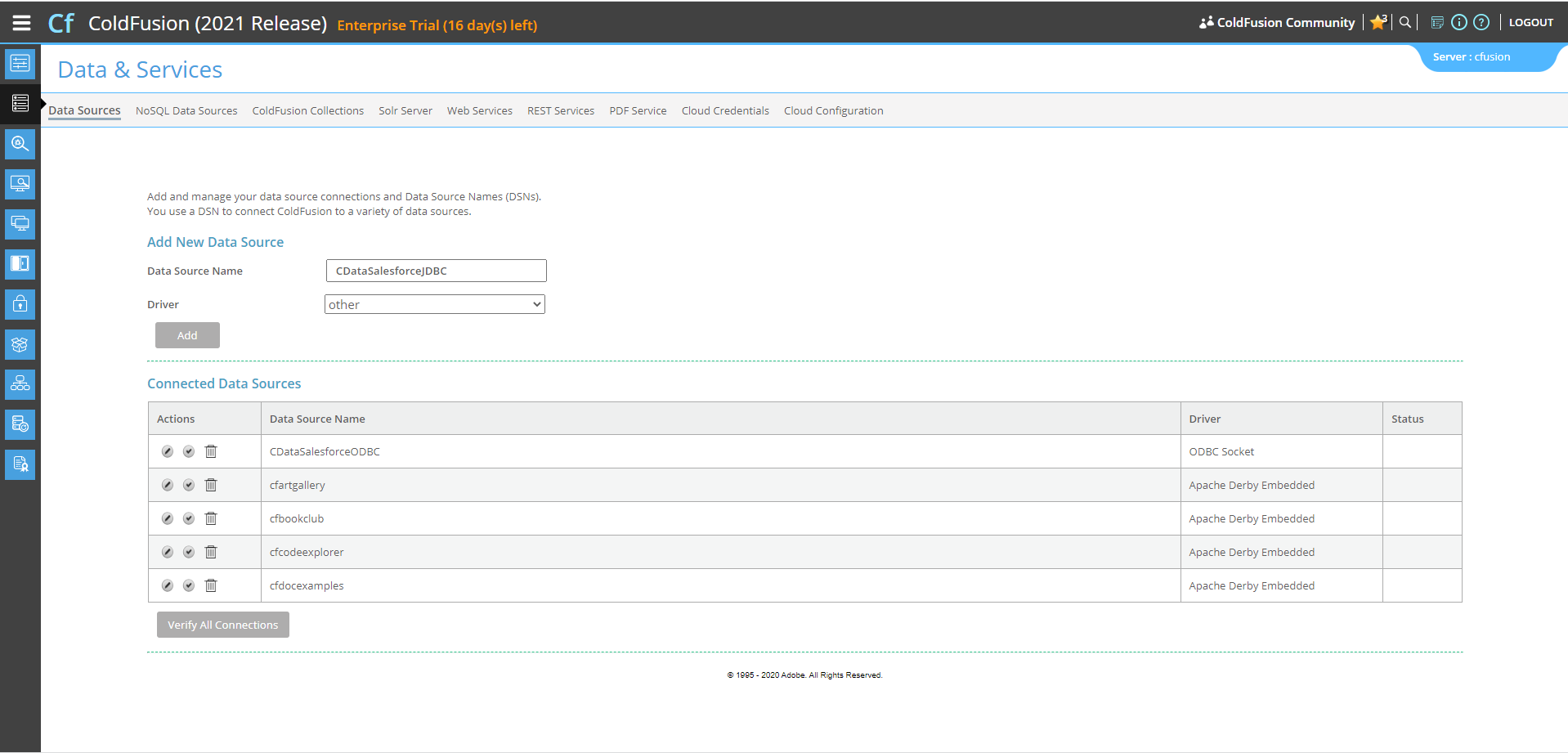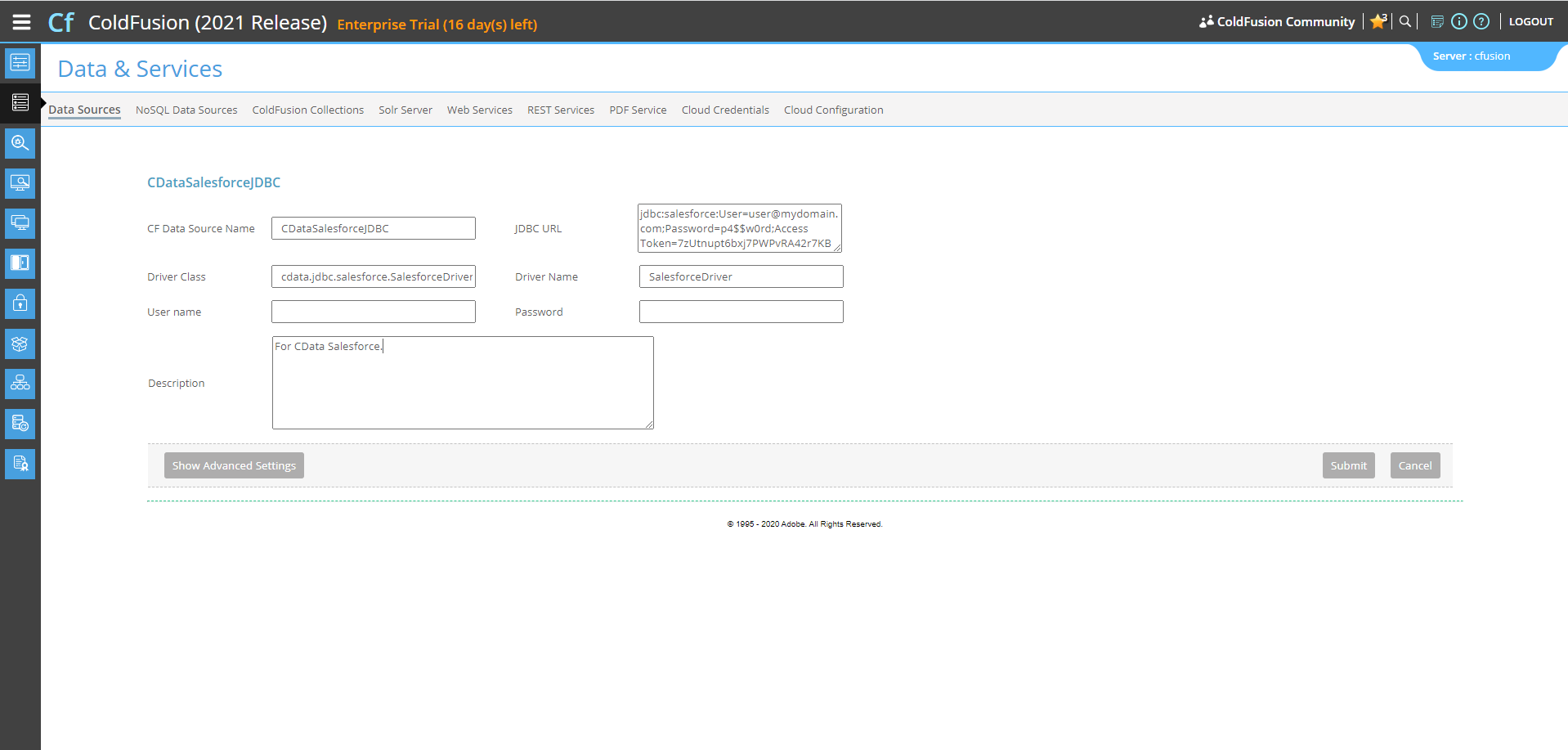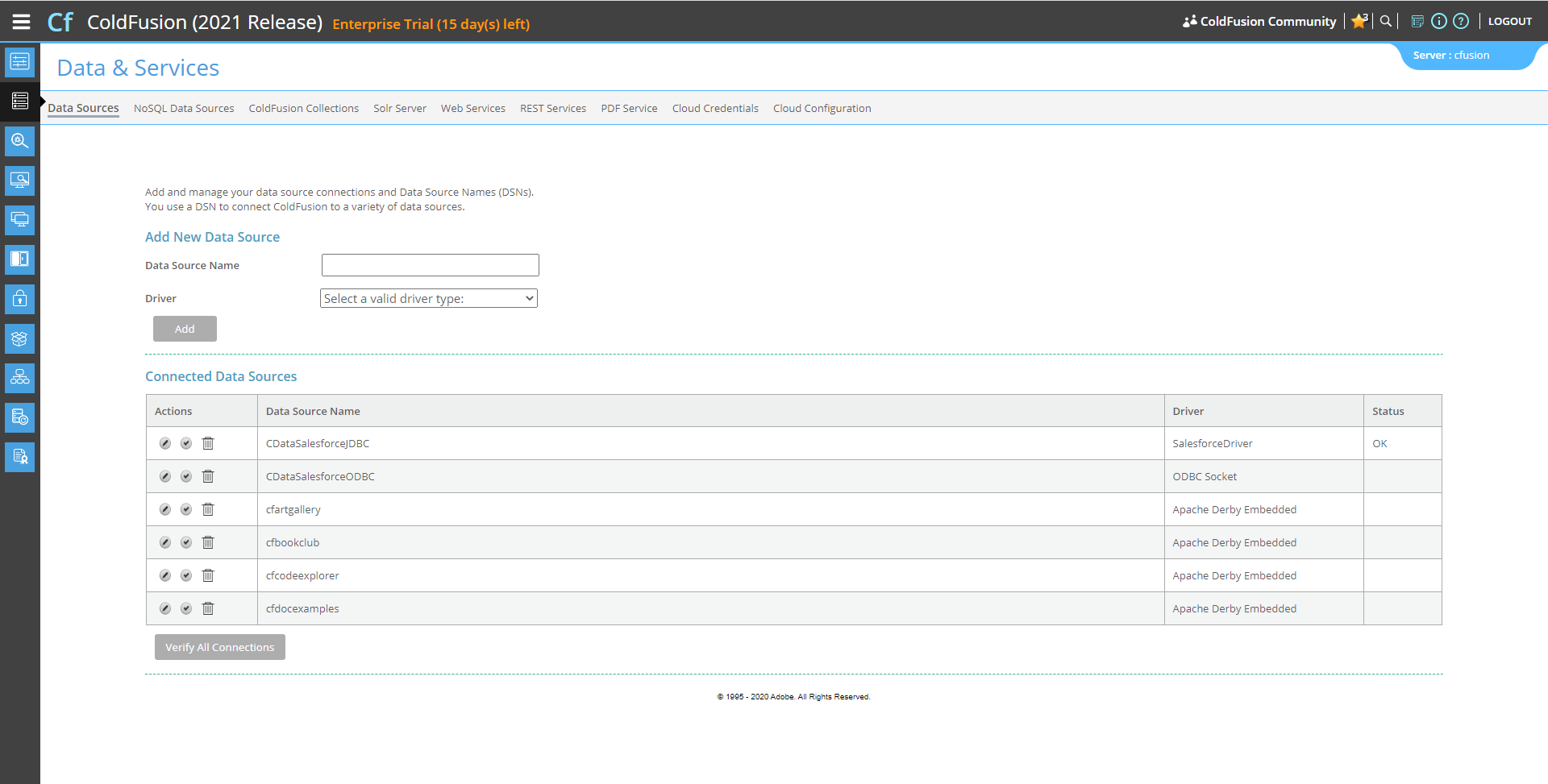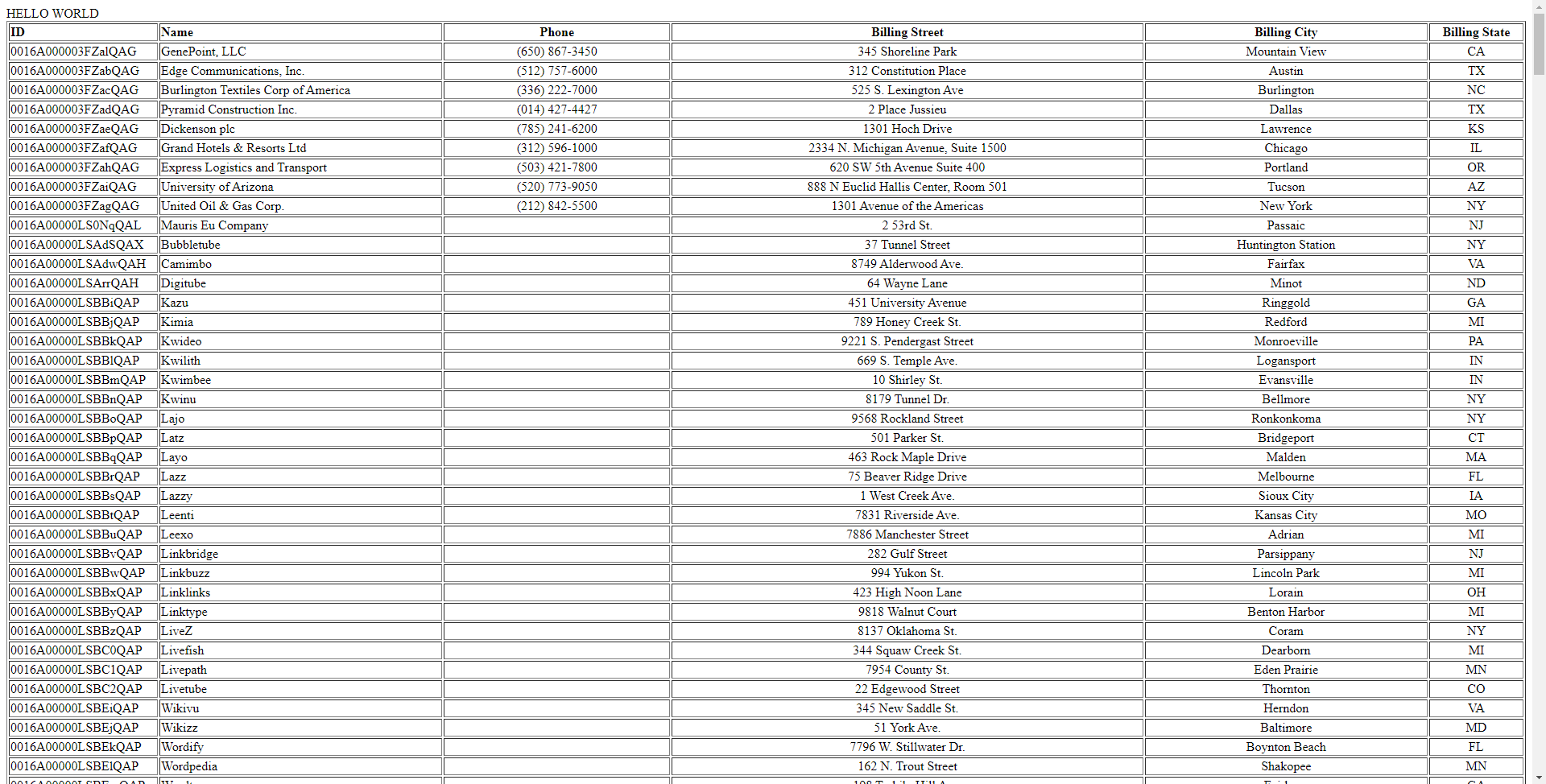Model Context Protocol (MCP) finally gives AI models a way to access the business data needed to make them really useful at work. CData MCP Servers have the depth and performance to make sure AI has access to all of the answers.
Try them now for free →Import Real-Time SQL Server Data in ColdFusion to Build Applications
Use CData JDBC drivers to import and use SQL Server data in ColdFusion.
Adobe ColdFusion is a web and mobile application development platform. It uses its own scripting language, ColdFusion Markup Language (CFML), to create data-driven websites as well as generate remote services, such as REST.
When ColdFusion is paired with the CData JDBC Driver for SQL Server, you can link your ColdFusion web and mobile applications to operational SQL Server data. This allows for your applications to be more robust and complete. This article details how to use the JDBC driver to create a table populated with SQL Server data from within a ColdFusion markup file.
With built-in optimized data processing, the CData JDBC Driver offers unmatched performance for interacting with live SQL Server data. When you issue complex SQL queries to SQL Server, the driver pushes supported SQL operations, like filters and aggregations, directly to SQL Server and utilizes the embedded SQL engine to process unsupported operations client-side (often SQL functions and JOIN operations). Its built-in dynamic metadata querying allows you to work with and analyze SQL Server data using native data types.
Configuring the Connection to SQL Server
You will need a JDBC connection string to establish a connection between Coldfusion and SQL Server.
Connecting to Microsoft SQL Server
Connect to Microsoft SQL Server using the following properties:
- Server: The name of the server running SQL Server.
- User: The username provided for authentication with SQL Server.
- Password: The password associated with the authenticating user.
- Database: The name of the SQL Server database.
Connecting to Azure SQL Server and Azure Data Warehouse
You can authenticate to Azure SQL Server or Azure Data Warehouse by setting the following connection properties:
- Server: The server running Azure. You can find this by logging into the Azure portal and navigating to "SQL databases" (or "SQL data warehouses") -> "Select your database" -> "Overview" -> "Server name."
- User: The name of the user authenticating to Azure.
- Password: The password associated with the authenticating user.
- Database: The name of the database, as seen in the Azure portal on the SQL databases (or SQL warehouses) page.
Built-in Connection String Designer
For assistance in constructing the JDBC URL, use the connection string designer built into the SQL Server JDBC Driver. Either double-click the JAR file or execute the jar file from the command-line.
java -jar cdata.jdbc.sql.jar

Adding a Data Source and Creating a Table
After configuring the connection, follow the steps below to add the CData JDBC Driver to ColdFusion's lib directory, add a new data source, test the connection, create a ColdFusion markup file, and, finally, make a real-time connection with SQL Server data and display it in a table written in the ColdFusion Markup Language, or CFML:
-
Copy the JDBC Driver for SQL Server and lic file from "C:\Program Files\CData[product_name]\lib" to
"C:\ColdFusion2021\cfusion\wwwroot\WEB-INF\lib".
cdata.jdbc.sql.jar cdata.jdbc.sql.licNote: If you do not copy the .lic file with the jar, you will see a licensing error that indicates you do not have a valid license installed. This is true for both the trial and full versions.
-
From the ColdFusion administrator interface, choose Data & Services.
![Selecting Data & Services]()
-
Here, we can "Add New Data Source". The data source name can be any name, provided it conforms to the ColdFusion
variable naming conventions. For our JDBC driver, choose "other", then click the "Add" button.
![Adding Data Source Name]()
-
Next, populate the driver properties.
- JDBC URL will need to be in the format: jdbc:sql:|connectionString|.
- A typical connection string looks like this:
jdbc:sql:User=myUser;Password=myPassword;Database=NorthWind;Server=myServer;Port=1433;
- The Driver Class is: cdata.jdbc.sql.SQLDriver
- The Driver Name is arbitrary and simply used to recognize the data source in the ColdFusion administration console.
![Populating driver properties]()
-
Now, test the connection by clicking the check mark to the left of the CDataSQL ServerJDBC data source you just created.
When the data source reports an "OK" status, it is ready for use.
![Testing the connection]()
-
Next, create a new ColdFusion Markup file (.cfm) and place it in the wwwroot directory ("C:\ColdFusion2021\cfusion\wwwroot")
for ColdFusion.
The following code queries the data source:
<cfquery name="SQL ServerQuery" dataSource="CDataSQL ServerJDBC"> SELECT * FROM Orders </cfquery>And a CFTable can be used to quickly output the table in HTML:<cftable query = "SQL ServerQuery" border = "1" colHeaders colSpacing = "2" headerLines = "2" HTMLTable maxRows = "500" startRow = "1"> <cfcol header="<b>ShipName</b>" align="Left" width=2 text="ShipName"/> <cfcol header="<b>Freight</b>" align="Left" width=15 text="Freight"/> ... </cftable>Full code, including the HTML portion is available below:<html> <head><title>CData Software | SQL Server Orders Table Demo </title></head> <body> <cfoutput>#ucase("SQL Server Orders Table Demo")#</cfoutput> <cfquery name="SQL ServerQuery" dataSource="CDataSQL ServerJDBC"> SELECT * FROM Orders </cfquery> <cftable query = "SQL ServerQuery" border = "1" colHeaders colSpacing = "2" headerLines = "2" HTMLTable maxRows = "500" startRow = "1"> <cfcol header="<b>ShipName</b>" align="Left" width=2 text="ShipName"/> <cfcol header="<b>Freight</b>" align="Left" width=15 text="Freight"/> ... </cftable> </body> </html> -
Finally, run the code locally in a browser at the default port of 8500. It produces a table populated with SQL Server data!
![Running the code]()
As a note, the CData JDBC Drivers also support parameterized queries using the cfqueryparam element.
For example:
SELECT * FROM Account WHERE name =
Get Started Today
Download a free, 30-day trial of the CData JDBC Driver for SQL Server and start building SQL Server-connected applications with Adobe ColdFusion. Reach out to our Support Team if you have any questions.

